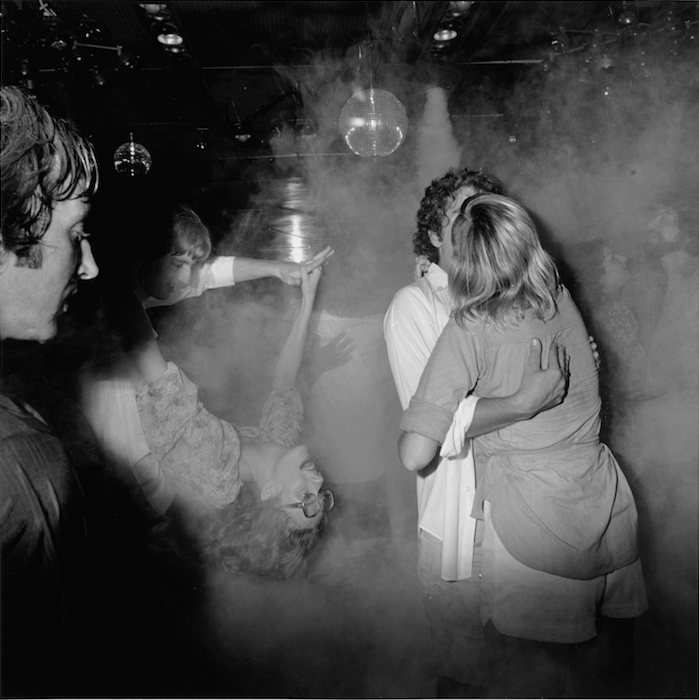Vince Aletti, Documentarian of Disco, On The Song That Sounded Like Sex

The smoking dance floor at New York, NY. Photo: Toby Old; Courtesy of Vince Aletti.
“The Loft was more like a weekly house party than a discoteque,” wrote critic Vince Aletti in a 1975 edition of the Village Voice, referring to that David Mancuso-helmed dancehall that infected downtown New York with disco fever. “The ceiling was hung with colored streamers and balloons… there were tables covered with bowls of fruit punch, nuts and raisins, bananas, small candies, and gum — once you paid your $3 (in the final year, $4) and stepped in the door, it was like being at someone’s — everyone’s —birthday party.”
With the reissue of Aletti’s memoir, Disco Files 1973-78: New York’s Underground, Week by Week, we asked the disco documentarian to revisit one of his most memorable nights at the Loft: the moment he first heard Donna Summer’s “Love to Love You Baby” — the Giorgio Morodor-produced club track that broke all the rules. At 16 minutes and 50 seconds, the song was the aural incarnation of sensuality, its bass-heavy crescendos punctuated by Summer’s deep-throated moans. As Aletti wrote in his September 20, 1975 weekly column for the music trade magazine Record World, “The most talked about album cut right now is Donna Summer’s extraordinary ‘Love to Love You Baby,’ the title track and entire side (16:50!) of her debut album… She does little else but moan passionately and repeat the title… it had everyone racing to the booth, asking, ‘What is that?”
———
I first heard Donna Summer’s “Love to Love You Baby” during a meeting of the Record Pool, that association of disco DJs that met occasionally to talk and pick up records companies had left there to be distributed to the jocks. Someone [Phil Gill] had brought a copy of “Love to Love” to preview it for the DJs, and it blew everyone away. Although I noted its “flimsy ‘Pillow Talk’-style lyrics,” referencing Sylvia [Robinson]’s 1973 record in my column then, I said “it’s deliciously excessive and bound to be one of the year’s great rush records, the sort some people hate but others die for.” Which it certainly was. A month later, it was a solid #1 on my Top 20 chart.
By that time, when the Donna Summer record came out, The Loft had moved to a new space at 99 Prince St. It was quite different from The Loft that I had got to know — The Loft that really did, in many ways, change my life. The original Loft that I knew was on Broadway, in David Mancuso’s own loft. It really did feel like going to a birthday party every week — a child’s birthday party. It’s not that I hadn’t gone to clubs before that, but I don’t remember having this sort of overwhelming feeling of the music being shaped very deliberately to change the mood of the room and the crowd. The sense of being manipulated in the most wonderful way, and having the music be essentially non stop — but always surprising. The things that David Mancuso put together were so unpredictable — it was like hearing a lot of things for the first time, especially exciting for someone writing about music. And that would happen week after week. It was an addictive experience. It became a real tapestry of weeks and months and years of going back, just for that feeling.
I remember them playing “Love to Love You” in the club, the first time for a club crowd, and just being amazed that it could work the way it did — that it could be that overwhelming and sexy and danceable at 15 minutes plus. It had that orgasmic sound to it; I don’t remember a song before that proceeded so much like love-making. Donna’s voice was so thoroughly woven into the music, but it was really this overall sense of eroticism that made it work. It had the length that you could really flow with it and let it completely take you away. A lot of DJs had mixed songs that would approach 15 minutes of length, but to start with something that was around 15 minutes was pretty incredible at that point. The fact that it became a radio record was really a surprise to anybody involved; I think initially most of us thought it would just be a great club record. A kind of breakthrough to the power of disco at that point, that radio found the record so compelling that they were willing to play the whole thing. The length, the sensuality, the storytelling and the sense of a new sound coming up — it really did start there with Donna Summer. It became a very specific sound that eventually took over — it became what people thought of as disco. And then, when disco was over, that was what people stopped hearing.






